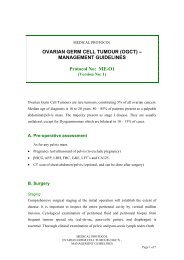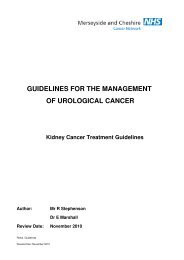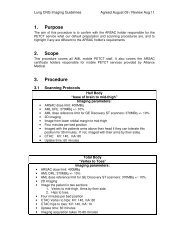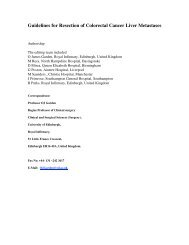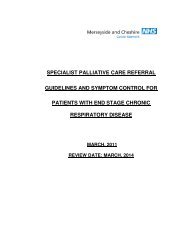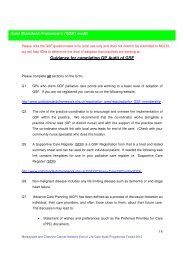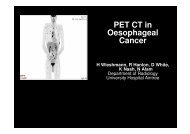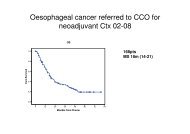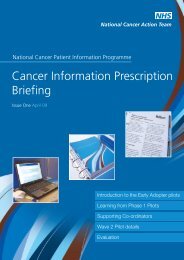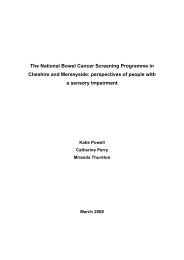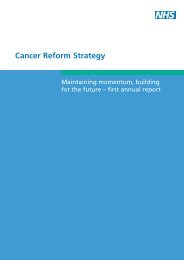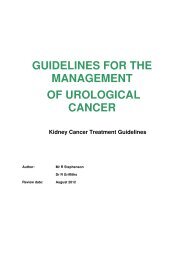Cancer Reform Strategy - NHS Cancer Screening Programmes
Cancer Reform Strategy - NHS Cancer Screening Programmes
Cancer Reform Strategy - NHS Cancer Screening Programmes
- No tags were found...
Create successful ePaper yourself
Turn your PDF publications into a flip-book with our unique Google optimized e-Paper software.
CHAPTER 3: DIAGNOSING CANCER EARLIER 53Box 11: Using health trainers to identify potential cancer symptomsAs part of the Improvement Foundation's Healthy Communities Collaborative, Health Trainers inHalton incorporated a new question into their interventions with individuals. The intention wasto allow people to share any unexplained physical symptoms that might need furtherinvestigation. The Health Trainers operate from Halton’s Healthy Living Programme which is apart of Halton and St. Helens PCT.The new question they asked was:“Have you noticed any unusual physical changes which have not been explained or investigatedby a healthcare professional?”Between the end of July and September 2007, 24 people were asked this question. Nineanswered 'yes' to the question and were advised to follow this up with their GP or practicenurse. Tracking by the Health Trainers revealed that two people have no specific health problemsrequiring treatment, three people have a non-malignant disease and two were diagnosed withcancer. The results for the remaining two people were not recorded as they did not presentthemselves to their local surgery.By including this simple question, advising presentation to a GP and following up the individuals,five people were found to have illnesses which might not otherwise have been diagnosed early.The impact of this therefore goes beyond cancer diagnoses and has the advantage of not havingto mention the word cancer to the individual.Halton and St. Helens PCT will now be using the question more widely, to see if it will pick upmore patients who would not normally seek advice about their symptoms. This pathway enablesnon-clinical staff to support people around their physical concerns.From January 2008 other lifestyle interventions in Halton will include the question about unusualsymptoms. The question is now included in the exercise on prescription questionnaire, of peopleenrolling in smoking cessation groups, the healthy ageing questionnaire for over 50s, a newmen’s health project and is to be used by Health Trainers in St. Helens also.This will increase the coverage across the patch to include 90,000 people in the most deprivedgroups.Working with primary careprofessionals to diagnosecancer earlier3.56 Primary care professionals have essentialroles at all stages of the cancer care pathway.One of the most important is in the diagnosis ofcancer.3.57 A GP with a list size of 1,800 patients canexpect to see only eight or nine new patientswith cancer each year and there many differenttypes of cancer. The GP will also see hundreds ofpatients with signs or symptoms which couldpossibly be due to cancer, such as lumps, weightloss, bowel symptoms, coughs andbreathlessness and difficultly swallowing.Typically, a GP will see one new case each ofbreast, lung, prostate and colorectal cancer eachyear, one case of less common cancers such asovary or pancreas every five or six years andsome rarer cancers such as testicular cancerabout once every 20 years. While the number ofcancers detected through screening isincreasing, the vast majority of cancer patientspresent first to a GP.3.58 In 2005, NICE published updated guidancefor GPs and primary healthcare professionals forwhen a patient should be urgently referred to aspecialist for investigation of suspected cancer.



